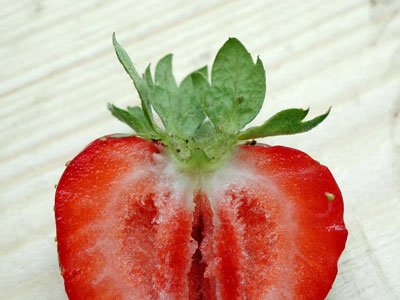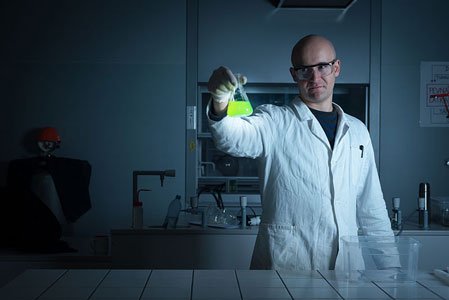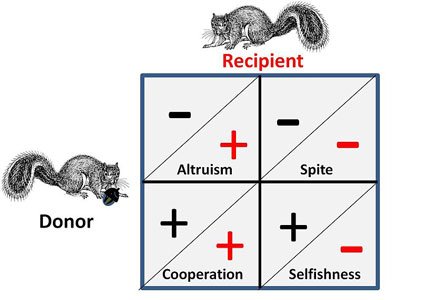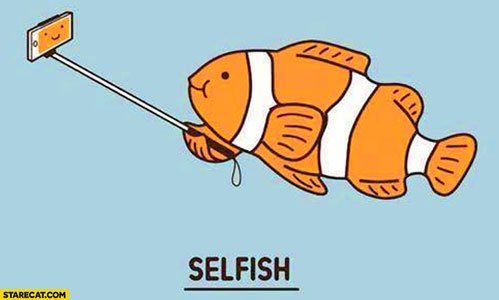
Source: wiki
I was watching The Fate of the Furious, and at one point Cipher (Charlize Theron), having kidnapped Dom's (Vin Diesel's) ex fling and their kid (we don't care who played them) and having killed the former, has the gall to say the following to him:
Everything you're feeling right now,
this rage, a sense of loss, it's not real.
It's a survival instinct
wired deep into our brains
to ensure continuation of the species.
When early man would visit a watering hole,
if they didn't watch their child,
and it got snatched by a crocodile,
our brains would create
a painful but instructional memory,
so it would never happen again.
This idea of "family"
that is so core with you,
that rules your world,
it's a biological lie.
Now, I know what you're thinking: "It's The Fast and the Furious, for Christ's sake, what did you expect, Stephen Jay Gould? The scriptwriter probably never took a class in biology, much less formal logic." (Or, maybe he did, and he put those words into the antagonist's mouth for a reason?)
I wouldn't have paid much attention to this if it wasn't in fact a very popular notion among people who, although educated, should really know better.
In this post I will unpack the argument presented by Charlize...I mean Cipher, and evaluate it. I'll be answering questions such as:
Is mother-love really just a form of selfishness? Does mother-love even exist?
Does a mother protect her children because she loves them, or does she protect them because, through them, she ensures the survival of her genes?
Do we really love a person we are romantically involved with, or are we just trying to propagate our genes?
So let's get to it.

Boy he looks pissed! Does that mean she's right?!
Source: who cares.
Making an argument
Let's break the argument up into sections. Let's use the natural periods to guide us. We have 4 sentences:
Everything you're feeling right now, this rage, a sense of loss, it's not real.
It's a survival instinct wired deep into our brains to ensure continuation of the species.
When early man would visit a watering hole, if they didn't watch their child, and it got snatched by a crocodile, our brains would create a painful but instructional memory, so it would never happen again.
This idea of "family" that is so core with you, that rules your world, it's a biological lie.
Sentence 1 is the conclusion. It says, "Family-love is a lie, it's not real, because..." Sentence 2 says, "Family-love is in fact a survival instinct, made to promote our survival (i.e. selfish)." Sentence 3 says, "This is, more specifically, the story of how and why evolution created family-love." Sentence 4 is a repeat of sentence 1 in different words.
So basically Cipher starts by telling us what she's going to prove, then she proves it, then she tells us that she has proved it. Much like the structure of this post.
Now Sentence 2 I won't deal with at length, because I've already dealt with it in another post.
To evaluate Cipher's argument, let's employ a trick I like to use.
The Substitution

Yummy or Not?
Source: pixnio or some such.
To reveal the logical construction of an argument, one trick I often use is to replace the content with a subject about which I feel neutral, something I am not invested in, but keep the logical construction identical. I find that this effectively gets rid of any biases. Let's perform this substitution:
The taste of this strawberry you're feeling right now, this sweetness, it's not real.
It's a survival instinct wired into our brains to ensure we get enough calories.
When early man would visit a strawberry bush, if he didn't eat the strawberries, he lost on an opportunity to pack some valuable sugar. Then a crocodile came along, ate the strawberries, and the man was left feeling the pangs of hunger, while the crocodile slept like a log with a full stomach and the man was staring at him all jealous-like. This created a painfully instructional memory in our brains, so that next time we'd eat the strawberries.
This idea you have, that strawberries are tasty and sweet, that is so core with you, that rules your world, is a biological lie.
Now I think it's pretty clear why this argument is ridiculous. First of all, 1 and 4 contradict 2 and 3: 2 and 3 tell us why we enjoy strawberries, and 1 and 4 deny that we enjoy strawberries. 2 and 3 give us the reason why X exists, and 1 and 4 deny X exists.
To me this was as plain as day without the substitution. As a philosopher, I had to (nay, I wanted to!) study formal logic, which, among other things, involved countless hours of poring over badly constructed arguments by politicians and celebrities and lawyers and philosophers and you name it, and then indicating the formal logical fallacies they have committed, if any, and then reforming the arguments into something that made sense. Papers upon papers, tests upon tests. When you do that, you start seeing logical fallacies everywhere. Thankfully, it fades.
But for most people, the badly constructed arguments aren't that apparent. The above argument, being part of a movie with a fast-moving plot, will just slip into our unconsciousness unexamined and, before you know it, more and more people will come to believe in it: next time they hear the same idea, it will sound familiar, and therefore not as far-fetched. After all, it's all based on science! Right?

"We have successfully isolated selfishness!" the depicted biologist stated in an interview.
Source: wiki.
Does biology really tell us that?
You're a mother, faced with someone who questions your love for your children. In your defense, you cite all the sacrifices you make for them.
"You're just banking for your future," the challenger says. "The children will take care of you when you can no longer take care of yourself."
"I don't care if they take care of me or not," you retort, "all I want is for them to be happy!"
"Yeah them and ... your genes!" he says snarkily.
"Come again?"
"You only love them because they carry your genes. You're just being selfish. You'd never make all those sacrifices for a stranger."
The challenger calmly puts pen upon paper and draws some game-theoretical equations that show that, even a mother who literally sacrifices her life for her three children, has lost 100% DNA carriers in herself, and gained 150% DNA carriers in her children (3 children who each carry 50% of her DNA), for a total profit of 50% DNA carriers.
"If you were a trader at London close," he finishes with a flurry, "that would be as a good a trading day as it gets!"
QED?

If you're using game theory to deduce selfishness from success, you're doing it wrong.
Source: wiki.
How Natural Selection really works
Let's think for a moment how natural selection works. Let's jump right in and assume at some point in the past all mothers had no love for their children. (If you are a person who has difficulty with hypothetical thinking of this sort, because your literal mind tells you, "But that could never happen, because then how did the children survive in the first place?", then let's assume mothering was the father's job, and women didn't care for their children at all.)
So, we got a group of mothers that care not at all for their children. Then, a mutation occurs in one mother, who suddenly feels some affection toward her child. The affection isn't full-blown love as yet (although, just like someone can be born a psychopath and lack feeling completely, I don't see why the reverse couldn't also happen, with strong feelings appearing where there were none in the average population).
Let's carefully examine what happened. Most mutations that occur, vanish, because they don't in fact promote the survival of the host. But the person who carries that mutation, will stick with it, necessarily, whether it leads to life or death. If it leads to life, trait X may continue to evolve because it leads to benefit Y, but that doesn't mean the reason the organism does X is because of Y: the organism would do X even if it didn't lead to Y, and in that case it would go extinct.
Now, when Cipher says that love for one's family is in fact "a survival instinct wired into our brains to ensure continuation of the species", she is putting the cart before the horse. But evolution doesn't proceed backward! Which is to say, it doesn't proceed teleologically! At the point of the mutation, no one knows whether the mutation will prove beneficial or not. And every single time this affection instinct is strengthened (to ultimately lead to full-blown love), it happens via a mutation, every single time. It doesn't happen because it will lead to the continuation of the species, or the propagation of one's genes.
This is what I'm saying: when love appears, it is the genuine article. It is honest. It doesn't know anything about genes. The mutation in fact could be one that led you to love lions, especially the inside of their mouth. It could be one that made you feel less scared of predators. All these feelings are real. They're not illusions. They're not goal-directed. They could get you killed. They could get your genes eradicated. Or not. Someone may have enjoyed the taste of some poisonous plant, and that's the last we ever heard of him. He really did like the taste of that plant. But the plant disagreed with him. Strawberries were more agreeable, so they stayed.

Reward =/= Motive
We saw above that when a trait appears, it is pure. It hasn't been tainted by preservation. It just stands there, completely naked and uncertain of its future. At no point can you accuse it of a because. Saying for instance that helping someone in need is a survival strategy because it's looked upon rather favorably by females who see you've got lots of resources to spare (and feed their children). That comes after. The mutation happens before.
But there's a further logical error being committed here: citing the benefit of the trait to undermine the underlying trait, confuses reward with motive. In principle, there is absolutely nothing tying the two (reward & motive) together. No logical relation whatsoever. In practice, someone may indeed do something for selfish reasons, but to discover it we need different methods: counting the benefits the action earns is definitely not one of them. It would mean that I could prove that everything Tom does is selfish, simply by following Tom like a tail and rewarding all actions he claimed were unselfish, and I would always win the argument. Tom gives all his money to the poor? I reward him with twice as much money. Therefore, Tom is selfish.
Just because Nature has decided to reward mother-love with survival, doesn't mean the goal of mother-love was, or is, survival. If I choose to make a musician rich because I like his music, it doesn't mean the musician plays music in order to get rich. No logical connection between result and motive. Mother-love just appeared, as a mutation, and it got favored. We can't take external benefit, and internalize it, and turn it into a motive. Much less say things like "sexual love is fake, it only aims at the propagation of your genes". Aims?! Nature has no aims! And animals know nothing about genes! What happened was, once upon a time, there was a guy who loved a girl. And there was another guy who didn't. One of those guys did more to earn the girl's affections, and therefore had more children. Nothing fake about that.

By being awarded the Nobel Peace Prize, Malala's selfish motives suddenly became apparent.
Source: wiki.
Final experiment
Let's do this last little experiment before we draw the curtain: let's reverse mother-love for a second and see what happens. Let's consider mother-hate.
There have been many baby-killing mothers in the news. Some of them burn the house down. Some stifle their children in their sleep. Let's say that for some reason this proved to be a beneficial thing to do: let's say Nature favors baby-killing mothers. Do you think Charlize would then turn to these mothers and say: "you don't really hate your child, it's a biological lie, what you're really interested in is your survival"? No, of course not: she would welcome the hate. Hate is real!
From this reversal of the argument, you can tell that the people who make the original version, are actually biased. Biased toward what? Perhaps what Simon Blackburn calls a Grand Unifying Pessimism: an effort to create a Grand Unifying Theory of human behavior that's all based on self-interest and selfishness. The Selfish Gene, he states as an example, has been co-opted for this purpose, even though its author has repeatedly repudiated the claim that genes are really selfish, or that their "selfishness" carries over into us macro-humans in any meaningful sense. (Blackburn discusses the issue of mother-love and psychological egoism in chapters of his book Being Good.)
Conclusion
And that's how you properly watch a movie! :P
Till next time.

Come join us on Discord! https://discord.gg/7qyarFD
You have great strategies of understanding logic here. Some I will definitely use. Focus on how we feel more often instead of thinking all the time and trust me, love results.
Many of these "everything is instinct and there is nothing good" arguments reveal more about the underlying psychological state of the person claiming such supposition than factual or scientific knowledge. These are like Rorschach ink blots. The imputed motive upon others is but a projection of their internal state and their fundamental perspective of the external environment.
In almost all instances of "science" being used to justify certain sociological or moral conclusions, the person already has an ingrained bias that he attempts to proselytize upon others. It is a form of insecure religious fanaticism gussied-up in pseudo-scientific drivel.
Mothers love babies because they get a shitload of attention while pregnant and while they have a baby. babies are also like adorable pets, which everyone loves. Then there's the tax incentive. It takes about 18 years for the novelty and the tax break to wear off, then parents kick their kids out of the house.
Just to make things clear, all I'm doing in the post is saying the argument as offered by Cipher (and many make this kind of argument) doesn't work. However, mother-love could indeed be selfish for other reasons. I myself have been a believer in psychological egoism from my early teens, and I probably still am (though it needs further investigation).
It also has more to do with chemicals than with mothers getting attention or whatever (but what you said it true in some cases, maybe many). But, as is the case with strawberries, chemicals don't mean they're not really sweet. In fact it means the opposite.
But plenty of bad parents out there, true.
@OriginalWorks
The @OriginalWorks bot has determined this post by @alexander.alexis to be original material and upvoted it!
To call @OriginalWorks, simply reply to any post with @originalworks or !originalworks in your message!
To enter this post into the daily RESTEEM contest, upvote this comment! The user with the most upvotes on their @OriginalWorks comment will win!
For more information, Click Here!
Special thanks to @reggaemuffin for being a supporter! Vote him as a witness to help make Steemit a better place!